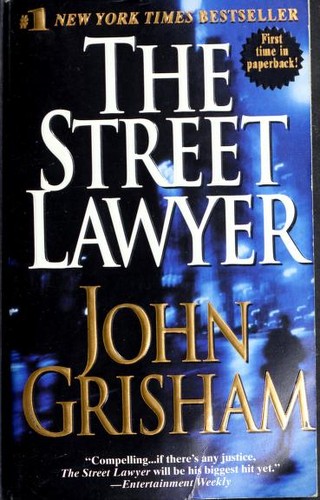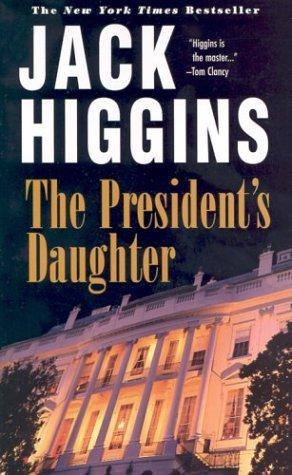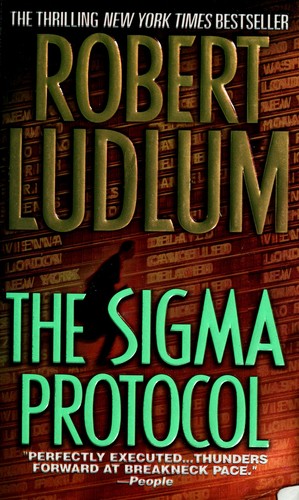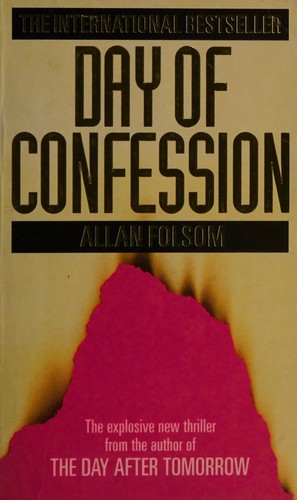Ashwin rated The Street Lawyer: 5 stars

The Street Lawyer by John Grisham
He gave up the money. He gave up the power. Now all he has left is the law.Michael Brock is …
I like to read science fiction, classics, thrillers, history and technology.
This link opens in a pop-up window

He gave up the money. He gave up the power. Now all he has left is the law.Michael Brock is …
The novella is about animals on a farm that free themselves from their human masters. At first they work hard, have equality and are happy. Soon, different classes form (pigs, dogs, the rest) and the farm takes on a communist flavour. From here on, Orwell takes the reader on a complete transition of the farm from freedom to communism to communist-dictatorship. Since Orwell is using animals (instead of humans) he can create classes and gets away with some brilliant analogies. The book is tiny and takes only a few hours. Must read.
The book is short and colorful with lots of runner photos. But, that's just about it. Other than a few tips you can glean here and there, Jeff seems to be just bullshitting his way through the book. There are entire sections in the book which don't say anything in summary. For example, the section on food doesn't suggest what kind of foods to eat or the section on cross training doesn't suggest any example exercises. Jeff might be the most popular author on running (I haven't seen his other books), but I was very disappointed with this book.

The President of the United States is being blackmailed by events which took place over thirty years before, when he …
Heart Of Darkness by Joseph Conrad could very well be the darkest and most serious book I've read. The story is narrated by a fictional character named Marlow to the author and others resting on a yawl. Marlow talks of his past journey on a steamboat up a river in a dark continent to bring back an ivory trader named Kurtz whom everyone reveres for his achievements. He reaches the colonial station after a risky adventure through the tropical land and finds Kurtz in a near death state. Also, his image of greatness falls after Marlow discovers the real activities of Kurtz in his colonial trading post. He sees Kurtz as a reprehensible being. Kurtz dies a while later on the journey back downstream. His last words indicate his probable realization of the havoc he has caused in his life. Back in Europe, Marlow faces Kurtz's widow and gives her …
Heart Of Darkness by Joseph Conrad could very well be the darkest and most serious book I've read. The story is narrated by a fictional character named Marlow to the author and others resting on a yawl. Marlow talks of his past journey on a steamboat up a river in a dark continent to bring back an ivory trader named Kurtz whom everyone reveres for his achievements. He reaches the colonial station after a risky adventure through the tropical land and finds Kurtz in a near death state. Also, his image of greatness falls after Marlow discovers the real activities of Kurtz in his colonial trading post. He sees Kurtz as a reprehensible being. Kurtz dies a while later on the journey back downstream. His last words indicate his probable realization of the havoc he has caused in his life. Back in Europe, Marlow faces Kurtz's widow and gives her his last words.
This novella by Conrad draws inspiration from his actual journey on the Congo river in Africa. The narration from the start is strongly evocative of darkness. Everything from the descriptions of the European towns, the Congo river, the African continent, the color of the inhabitant savages, their ways of life, the colonies of the Europeans, the cannibalistic Africans who form a part of his steamboat crew and ultimately Kurtz himself. The language drips heavily with vividness. I almost felt like being in Marlow's shoes journeying slowly up the Congo through the primeval continent. Though Marlow grows to hate Kurtz, in the end he is forced to leave him with a good name in this world. Like Life Of Pi, this book feels great since it left me with more than one meaning of its narration. Is Conrad talking of the dark continent or the darkness inside us?
Heart Of Darkness is short (hence called a novella) at just 112 pages. I read the Penguin Classics version edited by Robert Hampson. It has Hampson's long and boring introduction which would interest only those studying the book rather than reading it. It also has Conrad's actual Congo Diary in which he noted the happenings of his actual journey in Africa. This book has a detailed notes section at the end of the story.
Published in 1902, the book is available now at Project Gutenberg freely for everyone.
This is a compilation of op-eds by Noam Chomsky written for The New York Times Syndicate. And here's the irony -- supposedly the views in these op-eds are such that US papers (including NYTimes itself) have declined to publish them. However, they've been published widely in Guardian and other non-US newspapers. The 44 op-eds in the book run from 2002 through 2006. Reading them I couldn't even figure out why they weren't printed in the US. They didn't seem offending or much different from his usual writing.
The main topics of the op-eds are:
Iraq - US supported Saddam against Iran. He and the country becomes enemy when oil becomes important.
Israel/Palestine - US+Israel have been pushing down all possible resolutions to the never ending conflict. In the UN, US+Israel alone have been voting against policies which could help while the entire rest of the world have voted for it. …
This is a compilation of op-eds by Noam Chomsky written for The New York Times Syndicate. And here's the irony -- supposedly the views in these op-eds are such that US papers (including NYTimes itself) have declined to publish them. However, they've been published widely in Guardian and other non-US newspapers. The 44 op-eds in the book run from 2002 through 2006. Reading them I couldn't even figure out why they weren't printed in the US. They didn't seem offending or much different from his usual writing.
The main topics of the op-eds are:
Iraq - US supported Saddam against Iran. He and the country becomes enemy when oil becomes important.
Israel/Palestine - US+Israel have been pushing down all possible resolutions to the never ending conflict. In the UN, US+Israel alone have been voting against policies which could help while the entire rest of the world have voted for it.
South America - US screwed the nations here destroying validly elected democracies and putting up puppet presidents and dictatorships. The nations here have been moving left-center in recent years with independent leaders who are increasingly defiant to US.
Democracy - US bringing democracy to the world is such a farce. They'll support dictatorships, pull down governments, run elections, and of course force democracy -- basically do anything required to maintain control.
Power - The only way to keep US off your country is to develop/acquire nukes. See how they can destroy Iraq while they can't touch N Korea.
Policy - Chomsky and Sainath say the same with regards to this issue. Public opinion no longer matters. Public opinion doesn't influence public policy even a bit. Special interests, lobbies and big business run all the nation's policies.
* Iran - It's all about the control over oil honey.
Since these are op-eds written about current affairs, there is a lot of repetition of ideas while you read them. Since the op-eds are all byte-sized, the book is perfect to read over short breaks/commutes.

In Zurich, Switzerland, American investment banker Ben Hartman has arrived on holiday when he chances upon old friend Jimmy Cavanaugh …
I have to give credit to Dan Brown. Though he'll never win any awards for his writing, he somehow digs up the dirt on some really cool historical events and people. His second novel mimics his later The Da Vinci Code. Instead of Christianity, it's the Vatican City and the Catholic Church under fire here. There's even an Hassassin who is the mirror image of Silas. And Langdon runs around Rome finding clues from historical works of art, mostly that of Bernini.
So, what happens in the novel? CERN has discovered how to create antimatter. A capsule of this is stolen by the Illuminati and stashed it somewhere below the Vatican City as a time bomb. The Illuminati is a real underground group that rose from the rank of scientists like Galileo when they couldn't stand the atrocities of the Church against science. After hundreds of years, they're now back …
I have to give credit to Dan Brown. Though he'll never win any awards for his writing, he somehow digs up the dirt on some really cool historical events and people. His second novel mimics his later The Da Vinci Code. Instead of Christianity, it's the Vatican City and the Catholic Church under fire here. There's even an Hassassin who is the mirror image of Silas. And Langdon runs around Rome finding clues from historical works of art, mostly that of Bernini.
So, what happens in the novel? CERN has discovered how to create antimatter. A capsule of this is stolen by the Illuminati and stashed it somewhere below the Vatican City as a time bomb. The Illuminati is a real underground group that rose from the rank of scientists like Galileo when they couldn't stand the atrocities of the Church against science. After hundreds of years, they're now back for revenge. The Pope has just died and the cardinals are gathered in the Vatican to elect the next one. The Illuminati has captured their 4 popular candidates and will be murdering them one an hour at some of Rome's historical locations. It's up to symbologist Langdon and his CERN researcher Vittoria to stop the murders and defuse the bomb in time.
The ambigrams are a cool addition to the book. Just like in The Da Vinci Code, Langdon will suddenly stop at critical junctures and start spouting historical trivia. He claims all the places, incidents he presents from history are true. Dan Brown gathered some great elements for his story, but squanders it with amateurish writing. Not to regret too much, the book is still an unputdownable all-nighter.
In this book, Dennett tries to look at religion as a natural entity and attempts to examine all facets of it using the scientific method.
The spell that Dennett is trying to break here is that of religion and also of the oft-heard saying that religion can't be studied by science. The book is divided into 3 parts:
1. Opening Pandora's Box — Can religion be defined? How to define religion? Why should religion be studied as a natural entity? Can/should science study religion? Cui bono? Who benefits from religion?
2. The Evolution Of Religion — Why was religion born in nature? Why were Gods born? Why did folk religions domesticate into mainstream religions?
3. Religion Today — Is it religion that keeps society sane and moral? Is it religion that gives meaning to life?
Dennett is good at analogies. He draws comparisons to music, money, language, sex, sports, literature …
In this book, Dennett tries to look at religion as a natural entity and attempts to examine all facets of it using the scientific method.
The spell that Dennett is trying to break here is that of religion and also of the oft-heard saying that religion can't be studied by science. The book is divided into 3 parts:
1. Opening Pandora's Box — Can religion be defined? How to define religion? Why should religion be studied as a natural entity? Can/should science study religion? Cui bono? Who benefits from religion?
2. The Evolution Of Religion — Why was religion born in nature? Why were Gods born? Why did folk religions domesticate into mainstream religions?
3. Religion Today — Is it religion that keeps society sane and moral? Is it religion that gives meaning to life?
Dennett is good at analogies. He draws comparisons to music, money, language, sex, sports, literature and other such entities related to humans in his explanation of religion. He draws on a huge compendium of writing on evolution, memes and religion, with detailed endnotes and countless quotes. This was the first time I was reading a work that put religion into a clean, non-emotional scientific analysis. Dennett succeeds in asking the right questions, which as he confesses is harder than answering them. Some of the biggest influences in his study of religion are Charles Darwin's The Origin Of Species and Richard Dawkins' The Selfish Gene. The former is the forerunner to the discovery of the gene (an unit of biological evolution) while the latter introduces the meme (an unit of cultural evolution). I knew about the meme before, but Dennett applies it to explain the evolution of religion. It was here that I felt that the idea of the meme was so revolutionary that I've now resolved to read Dawkins' book.
The book is primarily aimed at those who are religious, though it gives loads of ammo for the non-believer. The book introduced so many things that I wasn't even aware of about evolution, cultures and the scientific method. I've got a higher respect for Darwin now. On the downside, the book is very verbose. I couldn't help but feel that Dennett could've easily removed loads of stuff and made the flow tighter. The book is also quite big at 448 pages which includes 4 appendices (which I conveniently skipped). In fact, the book introduced so many lines of debate and thought that I need to re-read it again to get a fuller understanding. I will reserve my final judgement about this book until then.
This book is well recommended, pretty old (1973) and written by Alan Lakein. The tone is informal. Alan talks about techniques of managing your long term goals, short term activities and assigning priorities. I've been reading the 43 Folders blog for quite some time now and so am already aware of most of these. There was nothing new I learnt from this book. The book is really tiny and can be finished in a few hours. If you're not doing any kind of time management/scheduling, then this book will help you a lot. But, if you're already done with newer techniques like Getting Things Done, don't bother with this one.
Authored by Gary Dorsey, the non-fiction book follows the Orbcomm LEO messaging satellite and its team from inception to launch. The author stayed with the team which built the satellite for 4 years to write the book.
By 1991, David Thompson, CEO of Orbital Sciences Corporation has tasted success with his startup company's Pegasus launch vehicles for commercial satellite launches. The company now aims for a new frontier - a low cost satellite messaging system. They plan a constellation of 24 cheap LEO satellites named Orbcomm for this. During this period, competition is hotting up with Motorola raising literally billions of dollars for its mega 66 satellite constellation Iridium.
The book follows the day-to-day travails of the Orbcomm team of mostly freshers from college as they try to build the first commercial messaging satellite. The project was planned to be completed in just 1.5 years, but drags on for a …
Authored by Gary Dorsey, the non-fiction book follows the Orbcomm LEO messaging satellite and its team from inception to launch. The author stayed with the team which built the satellite for 4 years to write the book.
By 1991, David Thompson, CEO of Orbital Sciences Corporation has tasted success with his startup company's Pegasus launch vehicles for commercial satellite launches. The company now aims for a new frontier - a low cost satellite messaging system. They plan a constellation of 24 cheap LEO satellites named Orbcomm for this. During this period, competition is hotting up with Motorola raising literally billions of dollars for its mega 66 satellite constellation Iridium.
The book follows the day-to-day travails of the Orbcomm team of mostly freshers from college as they try to build the first commercial messaging satellite. The project was planned to be completed in just 1.5 years, but drags on for a full 3 years. During this period, the team is pushed to the extreme by faulty parts, changing requirements and increasing weight of the hardware. Some of the parts that they fashion for the satellite turn out to be ingenious hardware and software hacks necessitated by the failings of the commercial parts of the time.
In the final chapter, even after the initial 2 satellites are launched in April 1994 they fail to respond to the earth station. The team works with almost no sleep for 2 months before they find the problem and fix it, thus bringing back Orbital from the brink of economic collapse. The company later launches all its planned satellites in the constellation. In comparison, Motorola is heavily delayed and even though it does launch its satellites, it goes bankrupt on its Iridium satellite phone system, not realizing the emerging potential of GSM global roaming agreements.
The author has kept so close to the Orbcomm team that sometimes it becomes unbelievable that the book is not fiction. The book is a good read. The workings of the management and engineers are covered in microscopic detail. However, he doesn't write to interest and can be boring at times. Also, there are just too many team members who are followed up in detail and it gets hard remembering who does what when they all come together.
Trivia: OSX is the name of the custom OS running inside the Orbcomm satellites.

A heart-thumping whirlwind of action, suspense & murder that reaches deep into the highest levels of Vatican power & uncovers …
Mark Tully has been reporting for BBC in India for more than 20 years. He's been in the thick of everything that has shaped our nation — the Emergency, Indira's and Rajiv's assassinations, the droughts, the floods, the IT wave and the liberalization. Mark Tully and Gillian Wright travelled extensively around India talking to people of all kinds about India's past and present problems for their book India In Slow Motion.
The book is broken into sections, each dealing with a problem facing our country. Some of the subjects of the book are Kashmir, water, farmer suicides, child labour and religion. The travels to far-off places, the interviews with rustic people are delightful and eye opening. In every single aspect, the government and bureaucracy turn out to be impediments. Also, it seems like the state governments have little autonomy, having to depend on the Center for everything. This stands out …
Mark Tully has been reporting for BBC in India for more than 20 years. He's been in the thick of everything that has shaped our nation — the Emergency, Indira's and Rajiv's assassinations, the droughts, the floods, the IT wave and the liberalization. Mark Tully and Gillian Wright travelled extensively around India talking to people of all kinds about India's past and present problems for their book India In Slow Motion.
The book is broken into sections, each dealing with a problem facing our country. Some of the subjects of the book are Kashmir, water, farmer suicides, child labour and religion. The travels to far-off places, the interviews with rustic people are delightful and eye opening. In every single aspect, the government and bureaucracy turn out to be impediments. Also, it seems like the state governments have little autonomy, having to depend on the Center for everything. This stands out clearly in the progressive states for whom the Center has just become a roadblock. And even in this bleak landscape, there are people with the spirit to make change. The takeaway for me from the book was the extensive historical origins of each problem that the authors detail. Tully does satirical takes on everything and everyone. For Indians, it might be a bit depressing to go through the book in a single read. I read it over several nights, this was easy since it is broken into independent sections. This is a good thoughtful read.
The book is a very short read. The latter half of the book is aimed at supervisors and the university, so not relevant to the student. The book is very useful since it tackles the big problems of the student-supervisor relationship head on. A lot of the tips are also real world and informal. However, the book is a bit skewed towards the UK doctoral process, though it never hurts the reading.
Why are people so scared of science? Why is most of the public so illiterate about science even though they use it every second of their life?
It is these problems that NYTimes science journalist Natalie Angier attempts to solve in this book by taking the reader on a fun filled, informational ride through the entire spectrum of science. The chapters of the book deal with scientific thinking, probabilities, scales, physics, chemistry, evolution, molecular biology, geology and ends in a bang with astronomy. This is not a dull science book with figures, facts and formulas. There is none of that. Instead, Natalie attempts to do storytelling in each chapter and explains everything using fun analogies and prose.
So how is the book? I felt it was great. Everyone, no matter how science literate or illiterate he is, will gain something from this book. Natalie's prose is superlative and her analogies …
Why are people so scared of science? Why is most of the public so illiterate about science even though they use it every second of their life?
It is these problems that NYTimes science journalist Natalie Angier attempts to solve in this book by taking the reader on a fun filled, informational ride through the entire spectrum of science. The chapters of the book deal with scientific thinking, probabilities, scales, physics, chemistry, evolution, molecular biology, geology and ends in a bang with astronomy. This is not a dull science book with figures, facts and formulas. There is none of that. Instead, Natalie attempts to do storytelling in each chapter and explains everything using fun analogies and prose.
So how is the book? I felt it was great. Everyone, no matter how science literate or illiterate he is, will gain something from this book. Natalie's prose is superlative and her analogies are really fun. Distilling the vast cloud of science into a few hundred readable pages is no easy task. I have to say that I haven't come across any work before that has achieved it like this book. Since each chapter deals with distinctly different areas of science, the book can be split over many days without any feeling of book amnesia. The only chapter where stuff went over my head was that on molecular biology, all that protein synthesis and folding was too much for me. Other than that, the book was a complete win-win. Basic science has progressed much beyond the textbooks of my school days. This book gave me a chance to catch up to some of it. I came out of this experience with a better understanding and awe for every single thing around me -- from the air I breathe to the sky I see every morning.